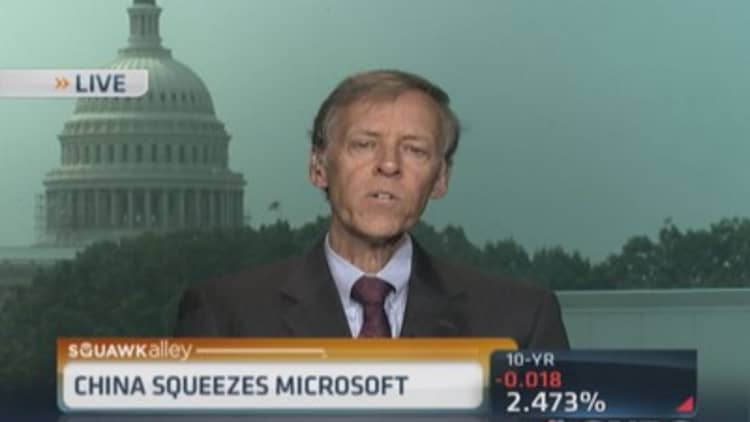China's recent anti-monopoly law enforcement may be less about targeting foreign companies than it is about combating a potential threat to social order: income inequality.
"Many foreign companies, by virtue of having strong brand positions, can add additional margins," Ben Cavender, an analyst at China Market Research Group, said. "They're sending a signal to firms that they can't get too greedy," he added.
Read More European companies slam Chinese antitrust probes
"They're worried about wealth inequality," he said, noting that in the wake of the mainland's economic slowdown, many wealthy individuals are continuing to benefit even as average consumers struggle.
China's gini coefficient, an indicator of the concentration of wealth in a society, is around 0.55, indicating a "severe" gap between rich and poor, compared with 0.45 in the U.S. and 0.30 in China in 1980, according to researchers at the University of Michigan. The scale ranges from zero to one, with zero indicating complete equality. The U.N. calls levels above 0.4 a predictor of social unrest.
Earlier this week, the European Chamber of Commerce in Beijing issued a rare public complaint about China's latest crackdown on alleged antitrust violations, calling them intimidation tactics unfairly targeting foreign businesses. Allegations of monopolistic behavior in China often lead companies to cut prices, even before an investigation is completed.
Last month, China's National Development and Reform Commission (NDRC) targeted German carmakers Daimler and Audi over the prices of auto parts, spurring announcements of price cuts.
Read More How firms learn to live with China antitrust raids
The European Chamber noted that these automakers have joint ventures, but their local partners weren't targeted.
"The probes into the autos sector are the latest salvo in a steady barrage of antitrust actions directed disproportionally against foreign firms," David Yang, an analyst at IHS, said in a note this week. "Nonetheless, antitrust actions against foreign firms do not always benefit domestic producers."
Yang noted that the probes targeting the auto industry come as the domestic players are already losing market share to more prestigious global brands.
"Significant price reductions on foreign cars would only put even greater pressure on domestic manufacturers, which compete primarily on price," he said. "Likewise, price reductions on foreign milk powder, eye-glasses, and other consumer products will likely put even greater pressure on domestic brands."
Read More
IHS expects foreign firms selling directly to Chinese consumers will remain vulnerable to antitrust enforcement for the next one to three years.
"Undeniably, the campaign has been popular with Chinese consumers," Yang noted.
Cavender also noted that authorities' latest campaign may be at cross-purposes with efforts to boost local industry.

"There's this duality between helping local businesses and making things more fair for consumers. These are two competing issues," Cavender said.
Read More China regulator says Microsoft should not obstruct anti-trust probe
But that can make it difficult for foreign companies to direct their operations on the mainland.
"Right now, it's challenging to be a foreign company here because you don't necessarily know where the pressure is going to come from next, even if you're doing the same thing the local companies are," Cavender said. "It's becoming more difficult to assess where the risks are."
—By CNBC.Com's Leslie Shaffer; Follow her on Twitter @LeslieShaffer1

